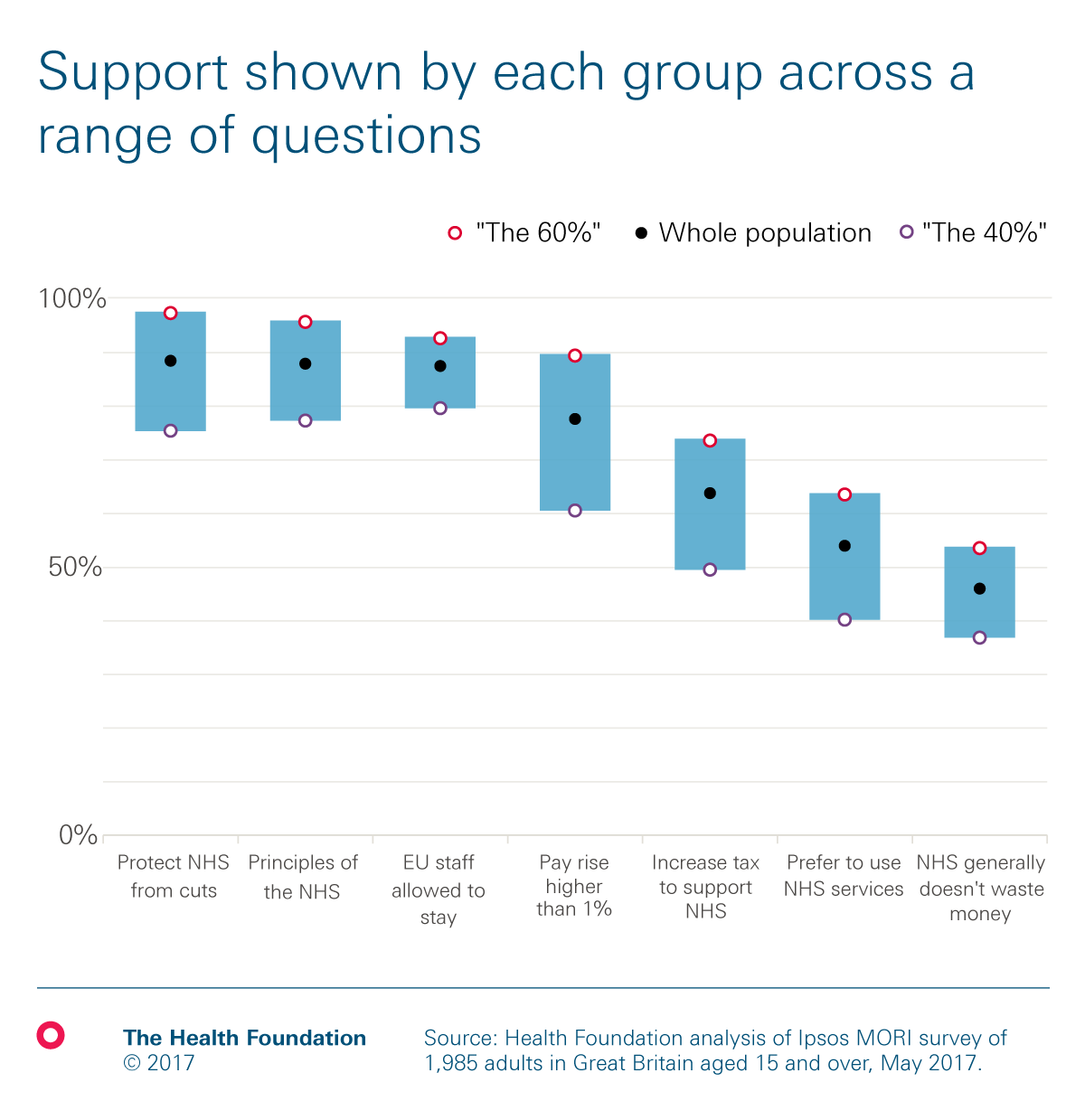Most of us spend the majority of our time with people who have similar opinions to our own. However, as the country limps towards a General Election, we are regularly informed of great schisms in public opinion. It is easy to think that the NHS is immune from this – that there is a national consensus, with just a few fringe views here and there, but that’s about it.
To an extent this is true.
Our recent polling, in association with Ipsos MORI, asked a number of key questions to find out what the public thinks about NHS and social care services. We found that there are some topics which united people. About nine in ten people:
- want to protect the NHS from cuts
- agreed that the NHS should be tax funded, free at the point of use, and provide comprehensive care for all citizens
- think that NHS and social care workers from the EU should be allowed to stay when the UK leaves the EU.
We polled 2000 people, so it starts to look like 1800 agreed on everything (and strongly supported the NHS), and then there were 200 who all agreed with each other – but not the other lot.
That might match with your experience (‘everyone I know agrees/disagrees with those things!’). But it’s also not quite right.
People’s views are much more mixed across the topics. What we want to see is if it’s possible to group survey respondents based on their answers across the survey. We can use statistics to do this and as it happens, there is a natural way of grouping respondents into two groups when it comes to their views on the NHS. The 10% referred to above, who seem unconvinced on the NHS, are more like a 40% – supportive but more mixed in their views. The 90% are therefore more like a 60% – universally supportive. So we have the flag-wavers (‘The 60%’) and sceptics (‘The 40%’).
The 60%
This group (which about 58% of us fall into) were fervently committed to the NHS across the board.
- They almost unanimously think the NHS should be protected from cuts.
- 90% of them strongly agreed with the principles of the NHS.
- A similar percentage thought that EU workers should be allowed to stay after Brexit and that NHS staff should get a higher than planned pay rise.
- 75% of them think that tax should be increased to pay for the NHS.
This group was the slightly more likely of the two to have used the NHS in the last year.
The 40%
But a significant minority (42%) of the population don’t quite fit into that group. They are supportive of the NHS. The majority of them:
- still think that the NHS should be protected from cuts
- strongly support the principles of the NHS
- think EU NHS and social care staff should be allowed to stay
- think that NHS pay should increase by more than planned.
But on some questions, the majority of them disagree with the flag wavers:
- about 50% of them don’t think tax should be increased to fund the NHS
- 60% of them are happy to be cared for in a non-NHS setting
- 63% of them think that the NHS wastes money.

Perhaps what is remarkable though is the strength of support for the NHS. 60% of people are strongly committed to the NHS almost across the board. And ‘The 40%’ are supportive as well – still committed to protecting the NHS from cuts, the rights of EU workers, pay increases for staff and the principles of the NHS. In fact, when we try and find a greater number of groupings in the data we don’t identify a group fundamentally opposed to the principles and funding of the NHS. This isn’t a blank cheque for politicians and policy makers, but a reminder of the strength of feeling towards the NHS that a majority of the population hold.
When a viewpoint is in the minority, it is easy to conflate it with a person being in the minority. What this analysis shows, however, is that people in ‘the 10%’ on one of our questions aren’t part of the fringe. They’re part of a wider group (equivalent to more than 25 million people) who have more mixed views about the NHS. So another challenge for politicians and policy makers (and us all) is to engage with this healthy scepticism and not ignore views that don’t fit with the majority. While this analysis supports the idea that the NHS might be ‘the closest thing the English have to a religion’, it also suggests that there’s a need to make clear it’s not just one for the evangelicals.
Ben Gershlick (@BenGershlick) is an Economics Analyst at the Health Foundation
Further reading
Work with us
We look for talented and passionate individuals as everyone at the Health Foundation has an important role to play.
View current vacanciesThe Q community
Q is an initiative connecting people with improvement expertise across the UK.
Find out more


